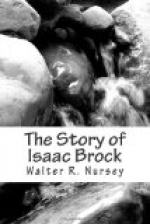[Illustration: CENOTAPH, QUEENSTON HEIGHTS]
Though the battle of Lundy’s Lane, fought on July 25th, was the last great engagement in 1814, and practically ended the war, the campaign was not destined to close without an exhibition of constitutional timidity on the part of Prevost, the man with the liquid backbone. With 11,000 seasoned veterans who had campaigned under Wellington, he advanced, September 14th, on Plattsburg, garrisoned by only 4,000 Americans, and when victory smiled in his face, he actually ordered the retreat. Overcome with humiliation, his officers broke their swords, declaring they “could never serve again,” and sullenly retraced their steps to the frontier. This was the crowning episode that destroyed Prevost’s reputation. Death rescued him from the disgrace of court-martial.
How clear-cut and free from blemish, in contrast with that of many of his contemporaries, stands out the brilliant record of Isaac Brock.
The Treaty of Ghent—while satisfactory to the people of Canada, bringing as it did a cessation of hostilities, permanent peace, and recognition of their rights—was received with mixed satisfaction by both political parties in the United States, after the first flush of excitement had passed away. “What,” the citizens asked each other, “have we gained by a war into which the country was dragged by President Madison in defence of free-trade and sailors’ rights, and in opposition to paper blockades?”
In the articles of peace, these vexed questions (as related in Chapters VIII. and XIV.)—questions which, as we have seen, were advanced by the United States Government as the real cause for war, were not even mentioned. Some worthy Americans, having suffered from the fighting qualities of the Canadian loyalists, publicly stated that the “declaration of peace had delivered them from great peril.” In some of the States “the universal joy was so great,” writes Gay, in his Life of Madison, “that Republicans and Democrats forgot their differences and hates and wept and laughed by turns in each others’ arms, and kissed each other like women.”
Another United States historian (Johnston) writes that “peace secured not one of the objects for which war had been declared, for, though Britain put a stop to the irritating ... practice of searching American vessels flying an American flag, she was not bound by the terms of the treaty to do so.” In the words of another recorder (Taylor), “Britain ceased the practice of search, not on account of war, nor of the treaty, but because the necessity of doing so had passed away—the European war being over.”
WHAT OF CANADA?
Canada, young as she was in the arts of peace and cruel practices of war, while honouring the memory of her heroes who had fallen in the splendid struggle against invasion, wasted no time in idle tears. The very atmosphere of her high northern latitude, the breath of life that rose from lake and forest, prairie and mountain, was fast developing a race of men with bodies enduring as iron and minds as highly tempered as steel. She drew another and a deeper breath, and, forecasting her destiny, with shoulders squared and fixed resolve, made ready to create an empire of industrial greatness which, under Providence, was to rank second to none.




